
The market for smart home technologies is expected to grow in the coming years | Credit: simpson33
Webinar hosted by BusinessGreen and Energy Networks Association (ENA) sees regulators, government officials and network operators discuss the future of the UK's flexible energy market
Flexibility services and technologies are set to play a starring role as the decarbonisation of the economy gathers pace, with smart technologies, demand-side response services, and energy storage expected to be critical to easing soaring pressure on the electricity grid and reducing energy bills as electrification sweeps various sectors.
The UK is already well established as one of the leading markets for flexibility services, with the energy sector estimating that roughly 3GW of flexibility services will be tendered during 2021. The government and Ofgem are well aware of the benefits of growing this emerging market, having published figures earlier this year that calculated that flexibility services could slash the costs of managing the British energy system by £10bn a year by mid-century. The combination of smart electric vehicle (EV) charging and vehicle-to-grid technologies alone could deliver temporary demand reduction of 32GW, according to separate figures published by Ofgem last week, curbing the need for costly additional generation capacity.
Yet despite significant advances in the space and much buzz among energy industry insiders who predict a future where households and businesses can slash their energy bills by optimising the energy use of their appliances and vehicles, and even make money by selling energy back to the grid, flexibility markets remain in their infancy. A number of regulatory and policy barriers are slowing development of the smart technologies and large-scale long-duration storage projects that can slash the cost of the net zero transition while providing security of energy supply for a renewables-dominated grid. The country's electricity networks may have committed to a "flexibility first" approach, but domestic flexibility solutions remain little understood by the general public and many businesses continue to ignore the cost savings on offer from established demand-side response services.
How to overcome these challenges was at the top of the agenda for the webinar hosted last week by BusinessGreen and ENA's Open Networks project, which saw some of the UK's leading flexibility experts offer an insight on the current state of the sector and the barriers policymakers, regulators, network operators, and energy suppliers must overcome if the UK's flexibility market is to fulfil its huge potential as a critical enabler of the net zero transition.
Participants were in agreement that the transition towards a flexible grid depends on a major reappraisal of the traditional roles held by players in the UK's energy market over the coming decade, as end energy users - whether businesses and households - become more active participants in the energy system and network operators' remit is expanded extend well beyond management of physical grid infrastructure.
Louise van Rensburg, head of DSO and whole system coordination at Ofgem, emphasised it was in all stakeholders' interest to build a flexible grid. "If we don't have flexibility, everyone is going to pay more to get to net zero," she said. Electricity system costs could be reduced between £30bn and £70bn between 2020 and 2050 by flexibility services, she added.
A robust flexibility market will also have a knock-on impact on the pace of uptake of electric vehicles (EVs) and other crucial clean energy technologies, she explained. "It is going to be something that has a real impact on the choices individuals make," she predicted. "For example, someone's decision to buy an EV may hinge on whether they can charge their car."
And while there have been significant advances in the UK's flexibility market, there is still much more work to be done, according to Van Rensburg. "There are a lot of systems and structures in place and a lot is happening," she said. "The problem is it is not enough yet. We need to broaden and expand it."
As such the regulator is currently working with government to change some of its regulations to enable a more flexible energy system, and last month published the Smart Systems and Flexibility plan, alongside the department for Business, Energy and Industrial Strategy (BEIS), that sets out how it plans to support, incentivise, and protect the market as it grows. BEIS and Ofgem also collaborated last month to publish the UK's first Energy Digitalisation Strategy, setting out how energy sector can be digitalised in a way that helps drive forward flexibility markets.
In addition, the government has pledged to invest £100m in energy storage and flexibility technologies through its £1bn Net Zero Innovation portfolio, announced last autumn. This innovation funding will be critical to the continued development of flexibility technologies, as will funding made available through Ofgem's network price controls regime and work underway to establish new standards for the sector, according to Van Rensburg. "It is equally really important that standards are in place to make it interoperable so that different types of technology can talk to each other, and you can have a usable framework," she said.
Meanwhile, Dr Caroline Sejer Damgaard, researcher at the Association for Decentralised Energy (ADE) and Scheme Administrator for Flex Assure, said a host of new types of companies were flocking to the energy sector to take advantage of the business opportunities opened up by emerging flexibility markets. "Industry is developing innovative solutions to enable energy users to access flexibility markets in ways suitable to their specific assets and needs," she said. "This is bringing in new actors and business models into this space, including aggregators, platform providers and other third parties who engage with business to help them take advantage of opportunities for energy users to engage with a flexible energy system."
Flexibility has to date had been largely centred on industrial and commercial markets, but much of the current development activity is now focused on domestic consumers, Damgaard said, emphasising that further innovation was required across all segments. "While existing technology does demonstrate that energy flexibility can and is already an important part of the solution, it is really crucial to stay open to innovation - both innovative technologies, as well as business models - and to keep that in mind as government and network operators design markets for flexibility and regulations," she said.
Sotiris Georgiopoulos, Open Networks Chair and head of smart grid development at UK Power Networks, the electricity distributor in the south east, emphasised how the energy sector would need to collaborate closely with rapidly electrifying parts of the economy to build market acceptance for 'smart' appliances, such as heat pumps and domestic storage systems. "Flexibility is going to go from a niche thing used by industrial, commercial and business customers to the mass market in the next decade," he said.
This shift will have to involve technologies being affordable and marketed to customers in a way they understand, he added. "We need to think how we build trust and confidence in [residential flexibility] markets, because it's all so new and there is no blueprint to follow around the world," he argued. "Collaboration is very important. The energy sector needs to work with the transport sector, the tech sector and others to learn as fast as it can. It needs to bring new skills in, digital skills, innovate, make use of the fantastic innovation resume that we have in the UK and move things as quickly as possible towards net zero."
Wrapping up the session, Dr Avi Aithal, Open Networks technical lead at ENA, also emphasised the push towards a flexibility grid would affect all energy users, no matter how large or small. "Everybody directly or indirectly involved with the energy system is going to be influenced by the flexibility market," he predicted.
The Open Networks project, which was launched in 2017 and brings together the nine electricity grid operators in the Britain and Ireland, aims to streamline progress in the flexibility market across the two countries.
Aithal urged all stakeholders to take part in the trade body's current consultations on the future of flexible services and flexible connections. "Flexibility has a wide remit, so some of the questions will be focused on the stakeholders directly involved or affected by it, but there are also questions that are broad," he said. "We are looking for input from everyone who can and wants to engage with the sector."
There is no doubt that the UK's world-leading flexibility market is set to grow over the coming decades as it assumes its role as a key enabler of the net zero transition. The question is whether the market will expand at the pace required to keep up with rapid expansion in renewables capacity and the electrification of various parts of the economy. While major challenges remain, the benefits for both the net zero transition and end users of energy provided by a flexible future have never been clearer.
The Flexible Futures webinar was hosted in association with the Energy Networks Association










